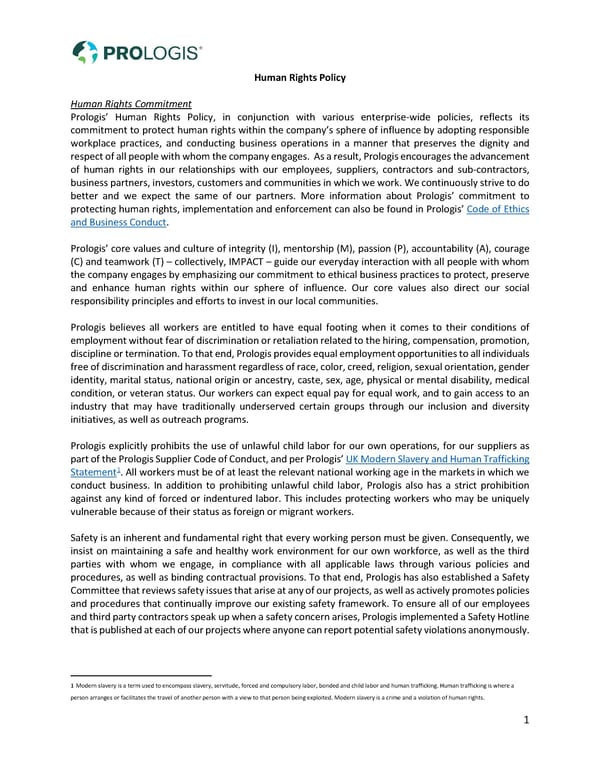Global Human Rights Policy
We uphold the protection of human rights across our company’s sphere of influence.
Human Rights Policy Human Rights Commitment Prologis’ Human Rights Policy, in conjunction with various enterprise-wide policies, reflects its commitment to protect human rights within the company’s sphere of influence by adopting responsible workplace practices, and conducting business operations in a manner that preserves the dignity and respect of all people with whom the company engages. As a result, Prologis encourages the advancement of human rights in our relationships with our employees, suppliers, contractors and sub-contractors, business partners, investors, customers and communities in which we work. We continuously strive to do better and we expect the same of our partners. More information about Prologis’ commitment to protecting human rights, implementation and enforcement can also be found in Prologis’ Code of Ethics and Business Conduct. Prologis’ core values and culture of integrity (I), mentorship (M), passion (P), accountability (A), courage (C) and teamwork (T) – collectively, IMPACT – guide our everyday interaction with all people with whom the company engages by emphasizing our commitment to ethical business practices to protect, preserve and enhance human rights within our sphere of influence. Our core values also direct our social responsibility principles and efforts to invest in our local communities. Prologis believes all workers are entitled to have equal footing when it comes to their conditions of employment without fear of discrimination or retaliation related to the hiring, compensation, promotion, discipline or termination. To that end, Prologis provides equal employment opportunities to all individuals free of discrimination and harassment regardless of race, color, creed, religion, sexual orientation, gender identity, marital status, national origin or ancestry, caste, sex, age, physical or mental disability, medical condition, or veteran status. Our workers can expect equal pay for equal work, and to gain access to an industry that may have traditionally underserved certain groups through our inclusion and diversity initiatives, as well as outreach programs. Prologis explicitly prohibits the use of unlawful child labor for our own operations, for our suppliers as part of the Prologis Supplier Code of Conduct, and per Prologis’ UK Modern Slavery and Human Trafficking 1 Statement . All workers must be of at least the relevant national working age in the markets in which we conduct business. In addition to prohibiting unlawful child labor, Prologis also has a strict prohibition against any kind of forced or indentured labor. This includes protecting workers who may be uniquely vulnerable because of their status as foreign or migrant workers. Safety is an inherent and fundamental right that every working person must be given. Consequently, we insist on maintaining a safe and healthy work environment for our own workforce, as well as the third parties with whom we engage, in compliance with all applicable laws through various policies and procedures, as well as binding contractual provisions. To that end, Prologis has also established a Safety Committee that reviews safety issues that arise at any of our projects, as well as actively promotes policies and procedures that continually improve our existing safety framework. To ensure all of our employees and third party contractors speak up when a safety concern arises, Prologis implemented a Safety Hotline that is published at each of our projects where anyone can report potential safety violations anonymously. 1 Modern slavery is a term used to encompass slavery, servitude, forced and compulsory labor, bonded and child labor and human trafficking. Human trafficking is where a person arranges or facilitates the travel of another person with a view to that person being exploited. Modern slavery is a crime and a violation of human rights. 1
 Global Human Rights Policy Page 2
Global Human Rights Policy Page 2